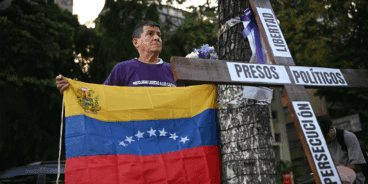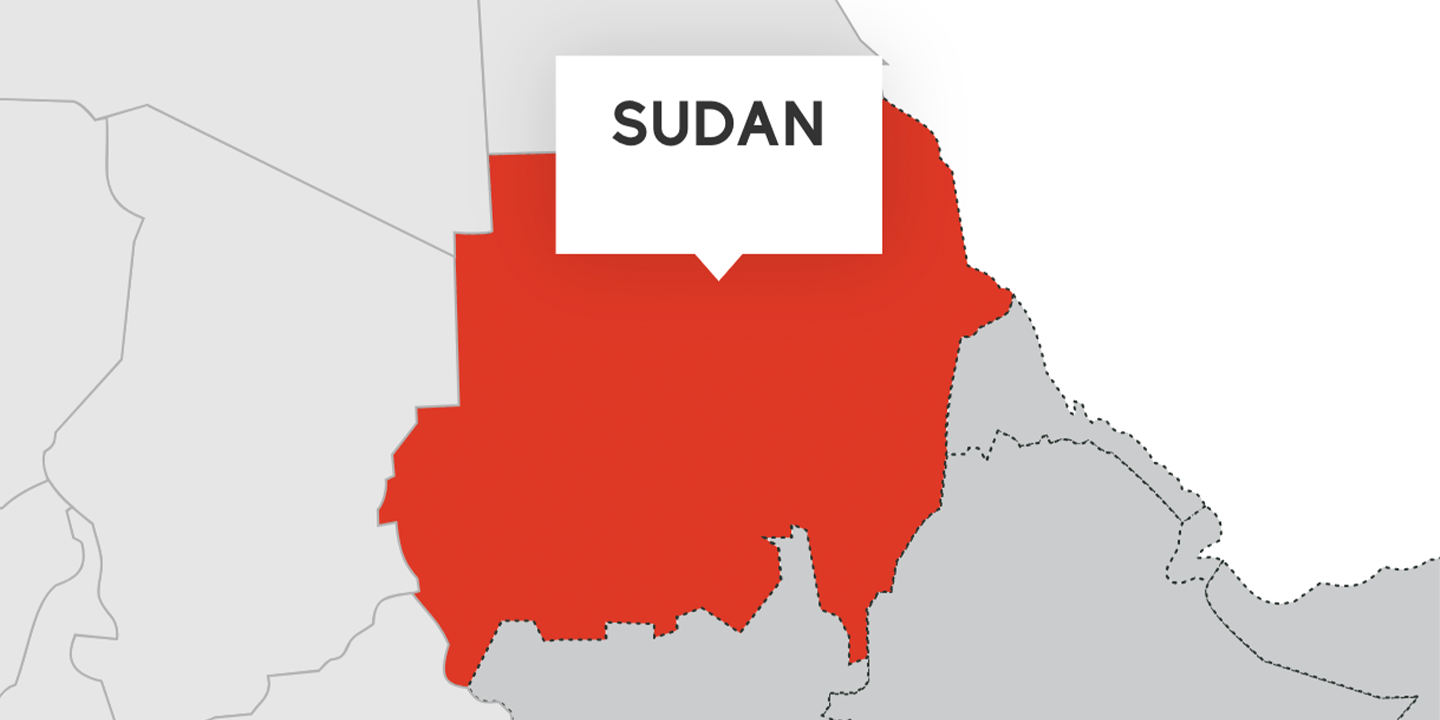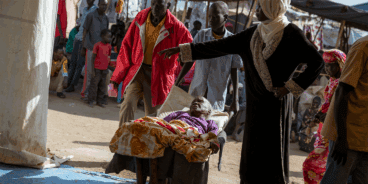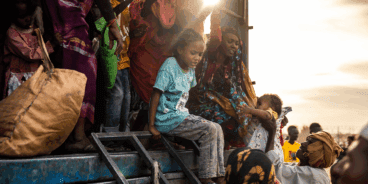

Sudan: Extend the mandate of the Fact-Finding Mission for two more years
To Permanent Representatives of Member and Observer States of the United Nations (UN) Human Rights Council (Geneva, Switzerland)
Your Excellencies,
Ahead of the UN Human Rights Council’s 60th session (8 September-8 October 2025), we, the undersigned civil society organisations, write to urge your delegation to support a mandate extension for the Independent International Fact-Finding Mission (FFM) for the Sudan.
In light of the serious violations of international law committed by all parties to the conflict, including alarming rates of sexual and gender-based violence (SGBV) against women and girls, and of the ongoing need to collect and preserve evidence and identify those responsible with a view to ensuring that they are held accountable, the next Council resolution on Sudan should extend the FFM’s mandate for at least two years. It should also request the FFM to regularly report to the Council in the framework of public debates on Sudan’s human rights situation.
By adopting resolution 57/2, in October 2024, the Council did not only extend the FFM’s mandate; it recognised the link between impunity and cycles of violence in Sudan. The voting result (23 in favour, 12 against) showed broad support across all regional groups for the FFM’s work and sent a clear message in favour of ongoing investigations and accountability.
The current conflict is now in its third year. Since fighting erupted between the Sudanese Armed Forces (SAF) and the Rapid Support Forces (RSF) and their allied forces, on 15 April 2023, tens of thousands of civilians have been killed and over 13 million have been displaced, which makes Sudan the world’s largest displacement crisis. Over 10.7 million people (or nearly a quarter of Sudan’s population) have been internally displaced, a figure that includes over two million new displacements in the first quarter of 2025 alone.
The humanitarian crisis is worsening. As of mid-June 2025, 30 million people needed lifesaving aid. According to a UN official, the health system has been “smashed to pieces, with cholera, measles and other diseases spreading,” while “hospitals and displacement camps have been attacked, critical infrastructure destroyed, and aid trucks hit, preventing them from getting food and essential supplies to those in such desperate need.” With the war continuing unabated and no signs of reprieve for civilians as both parties escalate their violence, and as all sides are targeting local responders, activists, and journalists, Sudan is on the verge of collapse, with catastrophic consequences for the protection of civilians.
Twenty-eight months after the start of the conflict, parties continue to show utter disregard for international humanitarian law, international human rights law, and their commitments under the Jeddah Declaration of Commitment to Protect the Civilians of Sudan. Violations they are responsible for, some of which may amount to crimes under international law, include targeted and indiscriminate attacks against civilians and civilian objects, arbitrary detention, torture, enforced disappearances, extrajudicial executions and other unlawful killings, widespread sexual violence against women and girls, and ethnically motivated attacks, including in Darfur, by RSF and allied Arab militias, against Masalit and other non-Arab communities.
SGBV is being committed systematically against the bodies of women and girls. Because deliberate obstructions to humanitarian assistance as well as armed attacks on medical objects and personnel causes constraints in the provision of key health services and psychosocial support, survivors of sexual violence are unable to receive the care they need. Numerous victims of gang rape have died as a result of their injuries or by suicide.
In its oral update to the Council, in June 2025, the FFM described a “brutal, multifaceted and increasingly complex conflict” whose shifting dynamics include revenge killings and reprisals. It added that “[w]hat began as a political and security crisis has become a grave human rights and protection emergency, marked by international crimes, that stain all involved.” It stressed that “[i]t is unconscionable that this devastating war is entering its third year with no sign of resolution.”
The FFM called on the international community to implement an arms embargo and ensure those responsible for serious violations are held accountable. Stressing that it had documented an “increased use of heavy weaponry in populated areas and a sharp rise in sexual and gender-based violence,” it said humanitarian relief was being “weaponized” and hospitals and medical facilities were “under siege.” The FFM also made clear that “[t]he scale of human suffering continue[d] to deepen.”
Nowhere is safe, and civilians bear the brunt of the conflict. They continue to be targeted for killings, through direct and indiscriminate attacks, artillery shelling and airstrikes, sexual violence, abductions and looting. Women and girls have been facing “escalating risks of gang rape, sexual slavery, trafficking, and forced marriage, particularly in Al Gezira, [Sennar], Darfur, and South Kordofan.”
Attacks against civilians have been reported in, among others, displacement camps and markets in Khartoum, Omdurman, Darfur, South Kordofan, and North Kordofan.
Recent months have witnessed an increase in the use of unmanned aerial vehicles (drones), including against humanitarian convoys and civilian infrastructure. A rise in extrajudicial executions of civilians has also been reported in North Darfur and Khartoum State, including as part of retaliatory attacks against people accused of having “collaborated” with parties to the conflict.
~ ~ ~
Against this backdrop, and despite ongoing challenges related to the UN’s liquidity crisis and Sudanese authorities’ continued refusal to allow its members and secretariat access to the country, the FFM has been able to carry out its work. It has continued to conduct interviews with sources, receive submissions, verify videos, geolocate attacks, and compile dossiers identifying possible perpetrators. It has carried out investigative missions to neighbouring countries and engaged in consultations with African Union (AU) officials and civil society. It has also initiated cooperation with relevant judicial entities and is mandated to “cooperate and share best practice with other international, regional and domestic accountability initiatives, as and when these are established, as appropriate.”
The FFM remains a critical international mechanism with the mandate, resources, expertise and experience to independently investigate and report on violations committed throughout Sudan, and that prioritises accountability. The FFM’s expertise includes the ability to use methodologies, tools, and methods of work to document, investigate and establish the facts, circumstances and root causes of violations, collect and preserve evidence, and identify perpetrators even without access to Sudan’s territory. The (SAF-aligned) Sudanese authorities’ refusal to cooperate with the FFM, despite Sudan’s commitment as a Human Rights Council Member and pursuant to UN General Assembly resolution 60/251 to “uphold the highest standards in the promotion and protection of human rights” and “fully cooperate with the Council,” does not and will not prevent the FFM from fulfilling its mandate.
~ ~ ~
As the FFM highlighted in its June 2025 update: “One message emerged with resounding clarity: peace without justice is an illusion. Accountability is not a luxury; it is a prerequisite for a sustainable peace in Sudan as its very absence is amongst the key root causes of conflict. The preparations for justice should therefore begin now, and any peace agreement must address issues of justice.”
Investigations and public reporting remain indispensable, with a continued strong focus on investigating the current atrocities, including crimes of SGBV perpetrated against the Sudanese people, particularly women and girls, by the warring parties.
As Sudan’s conflict is ongoing and egregious violations continue to be committed by all parties to the conflict, with further needs for collection and preservation of evidence and identification of perpetrators, there is no other option for the Council but to extend the FFM’s mandate.
At its upcoming 60th session, the Human Rights Council should therefore:
-
-
- Extend the mandate of the FFM, in full, for two years;
- Request the FFM to provide the Human Rights Council with oral updates on its work at its 62nd and 65th sessions, to be followed by enhanced interactive dialogues that should include the participation of the High Commissioner for Human Rights, representatives of the African Union, the Special Adviser to the Secretary-General on the Prevention of Genocide, civil society, victims and survivors and other relevant stakeholders, and comprehensive reports at its 63rd and 66th sessions, to be followed by interactive dialogues, and to present the reports to the General Assembly at its 81st and 82nd sessions;
- Recommend that the General Assembly submit the reports of the FFM to the Security Council for its consideration and appropriate action in order that those responsible for human rights violations, including those that may amount to crimes under international law, are held to account, including through the expansion of the International Criminal Court’s jurisdiction to cover the entire territory of Sudan and consideration of the scope for effective and targeted measures, including against those who appear to be most responsible for these crimes, taking into account the relevant conclusions and recommendations of the FFM;
- Call upon all parties concerned, including United Nations bodies, to consider implementation of the recommendations made by the FFM in its reports in order to address the dire situation of human rights in Sudan;
- Invite the FFM to consider ways of briefing all relevant United Nations bodies, including the Security Council; and
- Make clear that the Human Rights Council will remain actively seized of the matter, including by assessing the situation in Sudan and appropriate responses, which could include further extensions of the FFM’s mandate.
-
A two-year extension for the FFM’s mandate does not mean that the HRC should remain silent about Sudan for two years. Notwithstanding the proposed mandate extension, with associated reporting requirements, until the Council’s 66th session (September 2027), the Council should adopt a resolution on Sudan at its 63rd session (September 2026), taking stock of developments and following up on its action on the country to date. This should be a proactive initiative aimed at bringing violations and impunity to an end and advancing human rights and accountability in Sudan.
Furthermore, we urge the Council to follow up on resolutions S-32/1, 50/1, S-36/1, 54/2, and 57/2 by requesting additional reporting by the High Commissioner, with the assistance of his designated Expert, beyond the Council’s 61st session (February-April 2026). The Council should:
-
-
- Request the High Commissioner, with the assistance of the Expert on human rights in the Sudan, to submit to the Human Rights Council at its 64th and 67th sessions comprehensive reports on the situation of human rights in the Sudan and on violations and abuses committed by all parties to the conflict, to be followed by interactive dialogues with the participation of the High Commissioner and the Expert.
-
Finally, we urge States to pay their contributions to the UN in full and on time to mitigate the liquidity crisis and allow the FFM for Sudan, other independent investigations, and human rights bodies and mechanisms to fulfil their respective mandates, including by delivering outcomes and reports requested by intergovernmental bodies such as the Human Rights Council.
We thank you for your attention to these pressing issues and stand ready to provide your delegation with further information as required.
Sincerely,
- Act for Sudan
- Adeela for Culture And Art
- Advocacy Network for Africa
- African Centre for Democracy and Human Rights Studies (ACDHRS)
- African Centre for Justice and Peace Studies (ACJPS)
- AfricanDefenders (Pan-African Human Rights Defenders Network)
- Africans for the Horn of Africa (Af4HA)
- Afri-Sud Monitors for Human Rights Violations
- Alalg Center for Press Services
- Al-Jazeera Observatory for Human Rights (JOHR)
- Alliance for Peacebuilding
- American Friends Service Committee
- Amnesty International
- Anaka Women’s Collective for Refugees and Asylum Seekers
- ARTICLE 19 (A19)
- Atrocities Watch Africa (AWA)
- AWAFY Sudanese Organization
- Burkinabè Human Rights Defenders Coalition (CBDDH)
- Cairo Institute for Human Rights Studies (CIHRS)
- Central Minnesota Community Empowerment Organization
- CIVICUS
- Coalition for Genocide Response
- The Committee to Protect Journalists (CPJ)
- Community Development for Progress Organization
- Connection e.V.
- Consortium of Ethiopian Human Rights Organizations (CEHRO Ethiopia)
- CSW (Christian Solidarity Worldwide)
- Darfur Bar Association
- Darfuri Civil Society Bloc (Kamad)
- Darfur Victims Support Organization (DVSO)
- Darfur Women Action Group (DWAG)
- Darfur Women HRDs Coalition
- DefendDefenders (East and Horn of Africa Human Rights Defenders Project)
- Democratic Alliance of Lawyers – Sudan
- Democratic Monitor for Transparency and Rights
- Democratic Thought Project (DTP)
- Doctors Against Genocide
- Egyptian Initiative for Personal Rights (EIPR)
- Emgage Action
- Georgetown Institute for Women, Peace, and Security (GIWPS)
- Global Centre for the Responsibility to Protect (GCR2P)
- Hawai’i Institute for Human Rights
- Hraak to Change and Empower Youth
- Human Rights Watch
- Institute for Genocide and Mass Atrocity Prevention (I-GMAP), Binghamton University
- International Bar Association’s Human Rights Institute (IBAHRI)
- International Commission of Jurists (ICJ)
- International Federation for Human Rights (FIDH)
- International Peace Bureau (IPB)
- International Service for Human Rights (ISHR)
- Journalists for Human Rights (JHR) – Sudan
- Journal of Social Encounters
- Justiça Global
- Lawyers for Justice – Sudan
- Lawyers’ Rights Watch Canada
- Mouvement contre le Racisme et pour l’Amitié entre les Peuples (MRAP)
- National Network for Social Justice – Sudan
- Network of Human Rights Defenders of Guinea-Bissau (Rede dos Defensores dos Direitos Humanos da Guiné-Bissau)
- Network of the Independent Commission for Human Rights in North Africa (CIDH Africa)
- New Lines Institute
- New Sudanese Women Union
- No Business With Genocide
- NoirUnited International
- PAEMA
- Pax Christi International
- Pax Christi New York State
- PAX Netherlands
- Peace Action
- Peace and Development Foundation-Africa (PDF-Africa)
- PEN International
- Physicians for Human Rights (PHR)
- Protection International Africa
- Proximity 2 Humanity
- Public-Private Integrity (PPI) – The Gambia
- Raoul Wallenberg Centre for Human Rights
- REDRESS
- Regional Centre for Training and Development of Civil Society (RCDCS) – Sudan
- Rencontre Africaine pour la Défense des Droits de l’Homme (RADDHO)
- Rights for Peace
- Rights Realization Centre (مركز تفعيل الحقوق)
- Salam Media Organisation
- She Leads Movement
- Strategic Initiative for Women in the Horn of Africa (SIHA) Network
- Sudanese Feminist Platform for Peace and Justice (SFPPJ)
- Sudanese Organization for Justice and Human Rights
- Sudan Human Rights Defenders Coalition (SudanDefenders)
- Sudan Human Rights Hub (SHRH)
- Sudan Rights Watch Network
- Sudan Knowledge Centre
- Sudan Transparency and Policy Tracker
- Sudan Unlimited
- Tahrir Institute for Middle East Policy (TIMEP)
- Voice of Victims News Paper
- World Council of Churches
- World Organisation Against Torture (OMCT)
- Youth Citizens Observers Network (YCON Sudan)
This letter is also available to read and download in Arabic and French.
Related Content


Atrocity Alert No. 462: Sudan, Haiti and Mozambique
